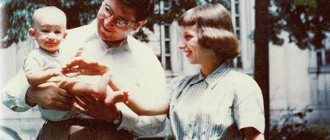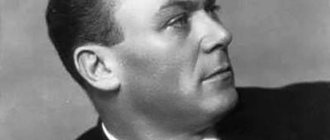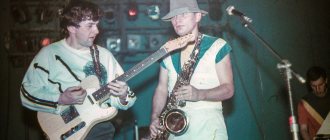Early years
If we talk briefly about the biography of Yuri Vizbor in his young years, we can summarize that he was born in 1934 in Moscow. Parents were from different cities of the Union Republics. My father came to the capital of the USSR from Lithuania when he was still a seventeen-year-old boy. And my mother was born and raised in Ekaterinodar (now Krasnodar). When Yuri was born, his father was in the ranks of the Red Army and was a commander.
The family was orphaned when Yuri was three years old - his father was repressed. During the harsh war years, mother and son lived in a house on Sretenka in Moscow. It is this factor that will have a great influence on Vizbor’s future work.
Childhood and youth
The biography of Yuri Vizbor is woven from creativity in all its manifestations. Yurochka was born on June 20, 1934 in Moscow. At the age of 14, he wrote his first poem, which marked the beginning of his work. While studying in high school, the boy was seriously involved in football, attended a flying club, and wrote down his impressions in poetry in a student notebook.
In 1951, Yuri entered the Moscow Pedagogical Institute named after V.I. Lenin. Just at this time, a new movement of art song was born within the walls of the mentioned university. It was then that Yuri Vizbor wrote his first song “Madagascar”. During his studies at the institute, he composed dozens of songs. In addition, it was he who became the author of the anthem of MPGU and MGTI.
In 1955, Vizbor received a diploma as a teacher of Russian language and literature. After working at school for several months, he was drafted into the Soviet Army.
First creative impulses
The young man wrote his first poem while in a pioneer camp. Inspiration came with falling in love. Yuri helped the counselors organize events for children. I never thought about the fact that he could become a singer, composer, or songwriter. Like all boys, during my school years I dreamed of becoming a football player and then a pilot.
At the age of fifteen, the guy began attending a local flying club, and two years later he learned to fly the Yak-18 and Po-2. After graduating from high school, I decided to enter a pedagogical university. The direction was chosen by chance.
Studying at the institute
A fellow classmate asked him to go and enroll at a pedagogical university. He was embarrassed to take the exams alone and needed support. Yuri agreed, although he laughed at the request of his hapless friend. The building of the university, located on Pirogovka, seemed unusually beautiful to Vizbor.
The young man successfully passed all the entrance exams and was enrolled in the 1st year of the Faculty of Philology. There were many talented young people among the students. The young man met Svetlana Bogdasarova, with whom Yuri subsequently recorded several songs and had close collaboration, within the walls of his alma mater. Ada Yakusheva, Yuri Koval, and Yuli Kim also studied there.
Creative biography
Both Yuri Vizbor and the students who studied on the same course with him became, in a sense, pioneers in creativity. In the 50s, the capital’s university was a real focus, the epicenter of the emerging genre of original, original songs. While still in his first year, the talented guy composed his first song - “Madagascar”. Thanks to this, he became one of the chosen ones. Vizbor became the brightest representative of talented philology youth. During all five years of study, he composed and presented to the world several dozen of his works.
After receiving his diploma, Vizbor was assigned to one of the schools located in the Arkhangelsk region. For some time he worked as a teacher of Russian language and literature. But his teaching career was interrupted by military service. Became a radio operator. Throughout his military service, he did not stop writing poetry and songs. Most of them were lines about the army. Later they were repeatedly published in the military district newspaper.
Becoming a bard's career
After demobilization, Yuri Vizbor did not want to return to school. He liked journalism. In 1957, he was hired as a member of the editorial staff of the audio newspaper Govorit Komsomoliya. Vizbor became both the organizer and the ideological inspirer of audio broadcasts.
Gradually, the fame of Vizbor spread throughout the capital, people listened to his songs and sang along. Over time, the whole country learned about Yuri. Students, tourists, and the capital's intelligentsia fell in love with his work.
In the early 60s, at the instigation of the bard, a new song genre arose - reportage. Before this, it had never occurred to anyone to come up with something like this. The work was first published in the magazine “Krugozor”, which began to appear thanks to the innovation. The first report song written by Vizbor is “On the Rasvumchorr Plateau.”
The beginning of Yuri Vizbor's career, new songs
After the service, Yuri decided not to return to teaching at school. He devoted himself to journalism. It was 1957. His place of work was the sound newspaper “Speaks Komsomoliya”, the organizer of which was the same Vizbor.
By that time, Yuri’s songs were spreading unofficially, first within the borders of Moscow, and then throughout the country. They were sung and listened to by students, tourists, and intellectuals.
In 1964, Vizbor created a new genre of song - the report song. For the first time such a work was published in the first issue of Krugozor. The title of this song is “On the Rasvumchorr Plateau.”
Movie
The country learned that Yuri Vizbor is a versatile person when he starred in a movie. The debut happened in 1966 in the film “July Rain”. Despite the fact that the role was episodic (a man with a guitar, Alik), the audience remembered him. He performed three songs in the film, one of which was his own composition - “Calm down, buddy, calm down.”
A little later, other roles followed: in “The Diary of a School Principal,” “The Red Tent,” and “The Beginning.” In the film “You and Me,” Vizbor was lucky enough to meet Alla Demidova on the set.
In 1970, the famous film “Belarusian Station” was filmed; Vizbor got a small role in this film, but also a very memorable one. The poet gained invaluable experience, met outstanding figures from the world of cinema: Anatoly Papanov, Evgeny Leonov, Margarita Terekhova and others. A little later, Vizbor played on the same set with Ekaterina Gradova, Vasily Lanov, Vyacheslav Tikhonov in “Seventeen Moments of Spring”. Yuri got a very unusual role, atypical for his role - Reichsleiter Martin Bormann. The voicing of his character was entrusted to another actor.
Yuri Vizbor - screenwriter, director and actor
Since 1970, Vizbor began working in the Ekran association on Central Television. He takes part in the creation of forty paintings, including such popular ones as “The Year 1943” and “The Year 1944”, “Watch on the Kama”, “Bratsk Yesterday and Tomorrow”. Based on his script, the feature films “Jump”, “Year of the Dragon”, etc. were shot. As an actor, Yuri Iosifovich starred in films beloved by millions such as “Seventeen Moments of Spring”, “Rudolfio”, “Red Tent”, “Retribution”,
“Moscow, passing through.” These films became favorites for several generations of viewers... In the feature film “July Rain”, Vizbor sang his own song “Calm, comrade, calm” and “Forgive the infantry” - a song by Bulat Okudzhava.
Heritage
The creative peak occurred in the 60s. It was then that Vizbor wrote most of his songs. In 1962 there were eight of them, a year later there were twenty-three. And each time there were more and more works. It was during this period that the bard was often invited to perform concerts. Thanks to his work at Krugozor, Vizbor managed to embrace the immensity. Through his efforts, the people united in a common impulse. The management sought this effect. In 1965, more than 20 songs were also written. Among which the most memorable were “Taxi”, “Three Minutes of Silence”, “Seryoga Sanin”. At the same time, a collection of Vizbor’s stories was prepared called “Zero Emotions.”
In the early 1960s, he also tried his hand as a screenwriter. Vizbor wrote narratives for several documentaries. The films were shot at the Sverdlovsk Film Studio (now located in Yekaterinburg). Basically, these were films of geographical content - “Tuva - the Crossroads of Time”, “September in Tuva”.
In general, several hundred works came from the pen of Yuri Vizbor. In his best years, he led an active concert activity, traveled to cities and villages of the country, and attended bard song festivals. He was very fond of rock climbing and mountain hiking, and many times became a participant in various expeditions.
Vizbor, Yuri Iosifovich
early years
Yuri Vizbor was born on June 20, 1934 in Moscow.
Mother - Maria Grigorievna, nee Shevchenko (1912-1999), was born in 1912 in Yekaterinodar, graduated from midwifery courses, worked at the sanitary and epidemiological station during the war and studied at the 1st Medical Institute. Then she worked for more than 30 years in the USSR Ministry of Health, was a member of international medical institutions, and visited almost 50 countries of the world[2].
Father - Iozas (Juozas) Ionasovich Vizboras (1903-1938, in Russia - Joseph (Juzef) Ivanovich Vizbor), Lithuanian, born in Libau, secondary education, sailor, during the Civil War on the Southern Front - commander in the Red Army, in mid-1930 's - in leadership work in the police of Tajikistan. In 1934 he was wounded in the back from a Mauser. Then he was an investigator at the OBKhSS in Moscow. On January 14, 1938, he was arrested, on March 23, 1938, a commission of the NKVD and the USSR Prosecutor's Office sentenced him to death on charges of belonging to a counter-revolutionary Latvian nationalist organization, under Article 58 of the Criminal Code of the RSFSR on points 6, 10 and 11, on April 5, 1938, the sentence was given in execution at the Butovo training ground of the NKVD, on August 14, 1958 he was rehabilitated posthumously[3][4][5].
In 1941, the family moved to Sretenka.
His mother, Maria Grigorievna, remarried, and his stepfather was Ivan Kuzmich Achetkov, a workers' faculty member who came from a simple background, but worked at the State Committee for Construction. Yuri's relationship with him did not work out. In 1951, my mother divorced my stepfather[6][7].
In his autobiography, Vizbor writes that at the age of fourteen he wrote his first poem[7].
Study at Moscow State Pedagogical Institute
In 1951, Vizbor graduated from Moscow secondary school No. 659 and entered the Moscow State Pedagogical Institute. V.I. Lenin - after unsuccessful attempts to enter MIMO, Moscow State University and the Moscow State University of Geodesy and Cartography (the “son of an enemy of the people” simply did not accept documents). The choice of university was influenced by his classmate Vladimir Krasnovsky, about whom Vizbor said: “There was no person in my life who would have had a greater influence on me than Volodya... He taught me to love music, songs, love and understand literature.” While still at school, he taught Yuri to play the guitar. At Moscow State Pedagogical Institute there already existed song traditions associated both with amateur performances of students and with tourism. Impressions from the first hikes in the Moscow region and Karelia became the basis for Vizbor’s first songs.
Songs "Madagascar"
and “Kentucky Boy” quickly became popular among Moscow students.
The letter “ P”
in the abbreviation of the name MGPI in the early 1950s stood for “
Singing
” among students. This was one of the centers of the genre of “amateur” or “author’s song” that was emerging at that time, and Vizbor immediately became the brightest representative of this genre[8].
During this period, Vizbor composed songs to well-known melodies or using them. The authors of some melodies were his friends V. Krasnovsky, S. Bogdasarova, V. Olenikov.
Dozens of Vizbor’s early songs date back to the period of his studies, including “Hymn of the Moscow State Pedagogical Institute—Moscow State Pedagogical University”:
There are many roads ahead,
and the train leaves for the east. We will always the bright years . There are many good meetings ahead, But we will remember and cherish the New Year's Hall, Dear Eyes, the Institute
.
Distribution and army
In 1955, Vizbor graduated from Moscow State Pedagogical Institute with a degree in Russian Language and Literature. From August to September, he worked as a secondary school teacher at the Kizema station of the Pechora railway (Arkhangelsk region), where he again went with Vladimir Krasnovsky. In October of the same year, both were drafted into the ranks of the Soviet army and served together in military units located on the territory of the Kandalaksha City Council of the Republic of Karelia (now Murmansk region). By the end of his service, he was a 1st class radio operator, a champion of the military district in radio communications. He composed poems and songs on army topics and published them in the newspaper of the formation and military district.
The army period, according to the compiler of the collected works of Yu. Vizbor - R. Shipov, played a decisive role in the formation of the author as a poet[8]. It was then that he composed the first song based on his own music - “Blue Mountains” (“I remember that winged land ...”). He fell in love with the North for the rest of his life, where he later returned both on journalistic matters and to see friends.
During his service and immediately after his transfer to the reserve, he wrote the story “Does not affect the service life” (first published in a two-volume collected works after the author’s death)[8]. In 1963, Konstantin Simonov gave it a positive review, but Boris Polevoy, editor-in-chief of the Yunost magazine, did not dare to publish it. The story is autobiographical: in the main character Konstantin Rybin one can discern Vizbor himself, and in his friend Vladimir Krasovsky - his school, college and army friend Vladimir Krasnovsky.
The beginning of a journalistic career and the popularity of songs
In October 1957, he retired from the army with the rank of senior sergeant and began working as a journalist, initially freelance at Moscow Radio. The post-army period (until 1963) was not easy in terms of everyday life: there was no permanent job, but a young family was created (Vizbor married classmate Ada Yakusheva). This marriage produced a daughter, Tatyana, who later became a journalist and radio presenter. During this period of creativity, Vizbor created one song after another - the truly popular “Okhotny Ryad”, “Dombay Waltz”
,
“Calm down, buddy”
, “Blue Crossroads”.
In 1960, Vizbor composed the song “If I Get Sick”
based on the poems of Yaroslav Smelyakov, slightly shortening the poem and making adjustments to match the musical size. It gained wide popularity and was published in the magazine “Musical Life” in 1961. In one of his radio speeches, Yaroslav Smelyakov said: “The greatest happiness for a poet is when his poems become a folk song without his knowledge. This is what happened with my poem “If I get sick…” This song became the first and last in which Yu. Vizbor acted only as a composer[9]. Vizbor's songs, distributed in unofficial tape recordings, gained popularity among the intelligentsia - first in Moscow, and then throughout the country.
Since 1963, he has refused to collaborate with friends in creating songs, using the help of professional composers only when composing songs “to order” for the stage, theater and cinema.
In 1957, Vizbor became one of the organizers of the audio newspaper “Komsomol Speaks”.
In 1961, together with S. Smirnov, he wrote the script for B. Rytsarev’s film “Above the Sky,” for which he also composed 6 songs, including “Dombai Waltz.”
“He gave his generation a voice, gave a genre, and it was from his light hand that the fad began and minstrels of subsequent generations appeared - the principle was recognized, the initiative was taken up, a tradition was created, an artistic system that influenced poetry and became part of it.” Lev Anninsky
[8].
In 1962, he took part in the creation of the Yunost radio station. He also begins concert activities.
In 1963 he acted as one of the founders of the sound magazine “Krugozor”, where he worked until 1970. On assignment from the magazine, he traveled all over the country and became the founder of the new genre of “ song-report.”
: in No. 1 of the sound magazine in 1964, the first such song was heard - “
On the Rasvumchorr Plateau
”.
In 1966, his reports were noted among the magazine's best materials. In the same year, Vizbor’s first collection of stories, “Zero Emotions,” was published.
In 1967 he joined the CPSU. He is writing a script for the documentary film “Tuva - Crossroads of Times” (Sverdlovsk Film Studio).
1971 was the first active year in Vizbor’s concert activities: 30 of his performances took place in cities across the country, and the most active year was 1976 (70 concerts).
In 1974, the premiere of the play “Autograd XXI” took place at the Moscow Lenin Komsomol Theater (director and co-author M. Zakharov), then the play “Not on the Lists” based on the story by B. Vasiliev. From 1974 to 1984, this play was staged in 27 theaters across the country.
In 1979, the Moscow Amateur Song Club prepared a collection by Yu. Vizbor.
In 1980, in collaboration with D. Sukharev, the lyrics of the song were created for the film “Moscow Doesn’t Believe in Tears” (directed by V. Menshov).
In the last years of his life, Vizbor continued to actively work in television films, create songs, including for television films, and perform in concerts. He has been involved in mountaineering all his life, participating in expeditions to the Caucasus, Pamir, Gissar-Alai and Tien Shan; was a ski instructor.
TV movie creator
Since 1967, having started creating scripts for documentaries and then trying himself as a director, by 1970 Vizbor went to work in the script department of the creative association “Ekran” of the State Committee on Radio and Television.
His business trips are related to the largest projects of the time: the construction of KamAZ and the Bratsk hydroelectric power station, the development of Samotlor, and the development of deposits in Yakutia.
For the script and text of the documentary film “Doctor,” Vizbor received the Grand Prix at the International Red Cross Festival in Varna (1976).
In 1976 he was admitted to the Union of Cinematographers of the USSR.
In 1979, the film “To the Pole!” (“Tsentranauchfilm”), the text for which was written by Yu. Vizbor, was awarded the Grand Prix at the International Film Festival in San Vincent (Italy).
Actor career
Vizbor played his first film role in 1966, starring in the famous film “July Rain” by Marlen Khutsiev. By Vizbor’s own admission, when the director called him and offered to star in a movie, he took it as a joke. Nevertheless, for a non-professional actor, Vizbor’s debut turned out to be very convincing; and the role of the charming “man with a guitar”, the seducer of girls Alik, became one of his main successes. In the film, Vizbor performed three songs - “ Forgive the Infantry
"B. Okudzhava, "Lunch Break" by E. Klyachkin and his own "
Calm down, buddy, calm down!...
".
In 1968 he starred in the film “Retribution” in the role of General Zakharov.
Subsequently, Vizbor regularly acted in films:
- 1968 - “Red Tent” ( Professor Behounek
), - 1969 - “Rudolphio” ( Rudolph
), - 1971 - “You and I” ( Sasha
), - 1973 - “Seventeen Moments of Spring” (Borman)
- 1982 - “Tenderness for the Roaring Beast” (Odintsov)
and so on.
Illness and death
In 1982, Yuri Iosifovich suffered a myocardial infarction, after which he successfully restored his health and even returned to his usual expeditions to the mountains. At the beginning of March 1984, at the Tsey
“Vizbor wrote his last song - “
Tseyskaya
”. Upon returning to Moscow he felt unwell and was diagnosed with liver cancer.
His daughter recalled[10]:
My father spent the last week of his life in the hospital; metastases were discovered in his liver. He was diagnosed in May and died in September. In 1980, while skiing in Kirovsk, my father fell and suffered a double fracture of the hip joint. There is an assumption that such a strong blow provoked the development of cancer cells. A year after the fall, I had a massive heart attack. In the hospital, my father endured terrible agony, but did not allow himself to be injected with morphine. He said: I don’t want to get used to it, so as not to become a morphine addict. Dad has a phrase: “Go to the bottom without lowering the flag.” That’s how he died: while talking to a nurse, complimenting her.
Yuri Vizbor died on September 17, 1984, at the age of 51, in Moscow. He was buried at the Moscow Kuntsevo cemetery.
Last years
In the 70s, Vizbor continued to conduct active concert activities. In 1971 he performed thirty, and a year later eleven concerts. Each time there were only more of them. In every city of the Soviet Union he was greeted enthusiastically.
In many films made not only at that time, but also a little later, the songs of the bard are heard - “My Darling”, “You Are My Only One” and others.
In the early 1980s, Vizbor wrote his last song, “Tseyskaya.” In April 1984, he was diagnosed with a cancerous liver tumor. The bard died in the fall. He was buried in Moscow. Thousands of fans of his talent still come to the grave of the songwriter.
↑ The work of Yuri Vizbor
He also belonged to that generation, whose representatives, in the figurative expression of the writer Vasily Shukshin, were “late” to be born and did not take part in the Great Patriotic War, but more than “fought the war” with their creativity. Several of Vizbor's best songs are devoted to a military theme - “Vitaly Palych”, “Seryoga Sanin”. And the song “Sretensky Dvor” is nostalgia for Moscow courtyards and a half-starved, but such a happy childhood.
And yet, if we talk about the thematic preferences of the bard, he was drawn to people of brave and courageous professions: climbers, pilots, sailors, fishermen and astronauts. He had strong personal friendships with some of the latter. Behind the outward romance of conquering mountains or exploring space lay hard work fraught with risk, when every next second a person could look into the face of death.
Mountains can be compared to a kind of litmus test. Here everyone is tested for decency, honesty and readiness to help a friend at any moment. And, perhaps, more than one generation of brave travelers in rare hours of leisure and relaxation will hum such Vizbor songs as “The skis are standing by the stove” or “This is for men.” And no one will be confused by exotic names - Rasvumchorr plateau, Ertsog, Khamar-Daban.
Not lost among the climbing and mountain songs of Vizbor are those, albeit less numerous, that are dedicated to the eternal feeling of love. To this day, Oleg Mityaev is one of Vizbor’s devoted fans, who has recorded an entire album of his songs, and includes the song “You are the only one for me” in his own concerts. And “My Darling” is sung at feasts, at rest stops, and at pop concerts. Vizbor was an excellent storyteller, although he almost never wrote humorous songs.
Perhaps, remembering how he got it for one of them, the lines from which that we are “ahead of the rest in the field of ballet” became truly winged and scattered across the country in the blink of an eye. It is customary to end many bard concerts with Vizbor’s songs “Night Road” and “Goodbye, Darlings.” Simple words, no poetic sophistication, no beauty of form - but how they touch the soul and remain in it forever.
Personal life of Yuri Vizbor and photos
The bard's biography is full of numerous acquaintances, including those with the opposite sex. The master was married three times. He entered into his first marriage with Ada Yakusheva in 1958. Thanks to this union, a daughter, Tatyana, was born. In the future, she became a television and radio journalist. After marriage, Tatyana gave birth to two children: Varvara and Yuri. The girl now performs under the name Vizbor and sings jazz songs. The young man graduated from the Moscow Art Theater School.
On the set of his debut film “July Rain,” the bard met actress Evgenia Uralova. Divorce proceedings and a new wedding followed. In 1967, the lovers got married. In this relationship, Yuri Vizbor again became a father. The couple had a daughter, Anna. And this marriage did not work out - after 7 years, Yuri and Evgenia divorced.
Vizbor's third passion was Nina Tikhonova. She was with the bard until his death. There were no children in this relationship. The woman became the last person with whom Yuri Vizbor connected his work and biography.
Tatyana Vizbor: family
Tatyana herself is the mother of two beautiful children: Yuri and Varvara. They are both creative people.
View gallery
Daughter Varvara enjoys performing songs written by her grandfather. She rightly believes that Yuri Vizbor’s songs will never become outdated. With her friend Sergei Khutas (jazz musician and composer) she created a musical project called “Vizbor VS Khutas”, in which they perform Yuri Vizbor’s songs in a modern arrangement.
As Tatyana Vizbor herself says, the children themselves chose their paths in life. She, like a mother, always supports them in their endeavors. For example, realizing that their son had undoubted musical abilities, the parents took the boy to a music school. However, the rigor of the pedagogical approach and academicism in teaching alienated little Yura. Then Tatyana Vizbor, whose husband supported her in this decision, did not force her son to attend music school, allowing him to go his own way. Now Yuri (Vizbor Jr.) is successfully demonstrating his abilities: performing, composing, and interpreting-arranger. People like him are the future of the original song.










